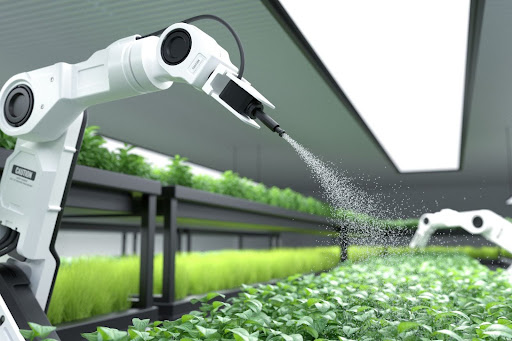With the heightened interest in sustainable and organic food, the farming sector has to employ advanced technology to meet soaring needs for organic food. Organic farming is fast changing as new instruments and approaches focus on increasing productivity without eroding sustainability.
Let’s look at some of the most promising trends in organic farming technology ahead and how agriculture management software is coming in handy for farmers in this tech-enabled arena.
1. Artificial Intelligence and Machine Learning in Farm Management
AI and machine learning enable organic farming with predictive analytics and precision agriculture. Through this, a farmer is able to collect data on weather conditions, the soil’s health, and crop growth, among other crop characteristics, in order to make informed decisions. AI can predict crop diseases, optimize planting schedules, or even predict market trends to give farmers an edge over the competition. AI solutions, therefore, play a crucial role in organic farming.
With integrated agriculture management software with AI, this process can be done from one place, thus making the farming process smooth and providing maximum health to crops without chemicals. This also enhances the yield of farmers and ensures that their crops are not ruined.
2. Blockchain for Traceability and Transparency
In the organic farming world, transparency and trust are essential; thus, blockchain is a game-changer for farmers. It would enable farmers to follow each step in their farm management in real-time, which includes land preparation, planting, harvesting, and distribution, from which information cannot be deleted or changed. This ensures every step complies with organic standards, allowing farmers to strengthen their relationship with the consumer and to smoothen the process of proving organic certification.
This would allow farmers to record the entire history of their produce so that consumers could trace back the important details.
3. Advanced Sensor Technology for Real-Time Monitoring
In modern farming, sensors are becoming an important constituent. It is making it possible to obtain real-time measurements of soil moisture, pH level, temperature, and several other critical environmental conditions. The use of such sensors would enable organic farmers to monitor their crops and the health of their soil remotely and react accordingly. For instance, in the event that the soil dries, sensors can automatically initiate an irrigating process whereby water consumption would be optimally managed.
When sensor-generated data is put together with a piece of agricultural management software, it can be analyzed and stored to help farmers make long-term improvements to soil health and crop yield.
4. Drones for Precision Farming and Crop Surveillance
Organic farming has embraced drones to provide an aerial view of larger fields, making crop surveillance more effective. It is equipped with high-resolution cameras and multispectral sensors for detecting pest or nutrient deficiency in areas. Since such targeted information is treated only in those affected parts, the resource will be conserved with a decrease in chemical contamination risks.
Future developments of drones would include advancements with AI capabilities, where drones can inspect crop health on their own without human assistance and then automatically transmit that data directly into farmers’ agriculture management software.
5. IoT Based Greenhouse Automation
Greenhouses are a controlled environment for organic farming. The Internet of Things technology is making it efficient in this field, which is revolutionizing. IoT automation in greenhouses controls temperature, humidity, and lighting conditions in such a way that optimum conditions for crop growth can be created. It minimizes dependence on external climatic conditions and allows year-round organic farming.
Interconnected IoT systems may be integrated into agriculture management software, where farmers can monitor and adjust greenhouse conditions remotely in real-time.
6. Robotics for Labor-Intensive Tasks
Agriculture is also facing labor shortages, and organic farms are not exempted. Robotics technology is proving to ease this problem by automating the more labor-intensive steps of planting, weeding, and harvesting. Robotic harvesters can identify ripe fruits and vegetables without damaging the plants by using advanced sensors and AI-driven vision systems.
For organic farming, for example, where minimal disturbance in the soil is a necessity, robots better ensure constant and gentle application to tasks that otherwise would have had to be handled by humans.
7. Vertical Farming and Hydroponics for Space Optimization
When people are growing, traditional farmland is scarce. Therefore, innovations in the sense of focused areas such as vertical farming and hydroponics are being recognized to give organic farmers an option of growing crops in layers.
These systems save up to 90% of water usage and thus are very environmental-friendly for sustainable agriculture. With the expansion of cities, vertical farming and hydroponics are likely to become integral in the landscape of organic farming.
8. Big Data for Informed Decision-Making
It has empowered farmers with worthwhile insights, from crop performance to the trend of markets. Organic farming will thus be able to make better decisions in choosing crops, scheduling planting, and resource management based on large volumes of data analyzed. Big data helps in identifying patterns towards improving crop resilience and reducing the loss of crops.
When put together with agricultural management software, big data gives a general overview of the farm operation and is able to allow the farmer to make and implement policies that result in productivity without adversely affecting organic standards.
Conclusion
Organic farming’s bright future indeed comes from technology, which will further push sustainability and productivity. From AI and blockchain to IoT and robotics, those are the waves in the industry that have given organic farmers all the necessary tools to flourish. It is this agriculture management software that sits at the heart of such change, streamlining the operations and empowering farmers with data-driven insights into their changing agriculture concerns.
At ASQI, we believe innovative technology solutions will move organic farming forward. Being a technology-enabled agriculture and sustainability platform, we are committed to supporting the farmer on this journey to a sustainable future. Join us in creating a more transparent and resilient food supply chain.







